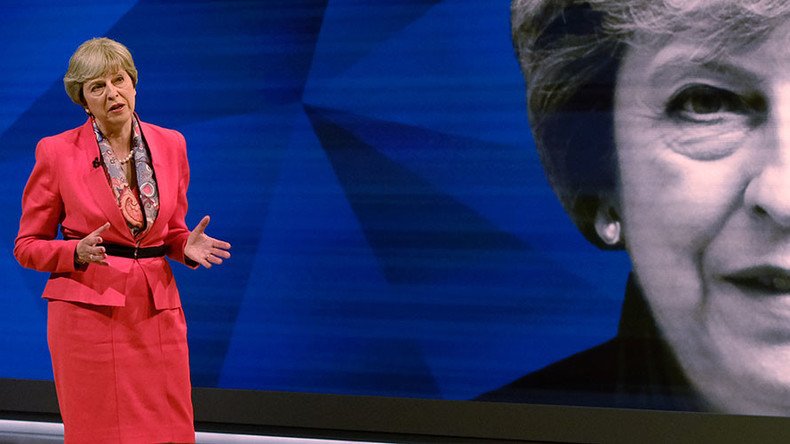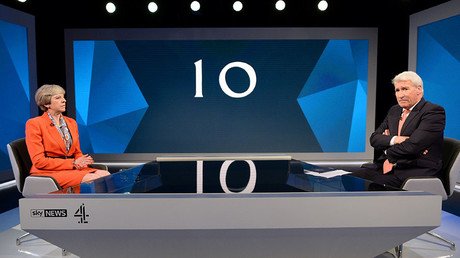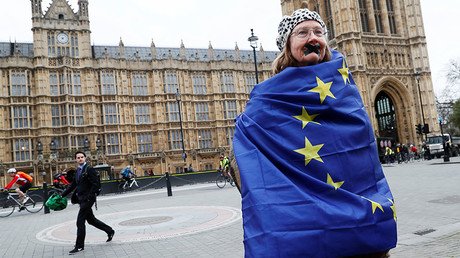The Long Goodbye: May says she’ll push for ‘hard Brexit’ as Corbyn insists on deal with EU

With just over a week to go until the general election, Theresa May and Jeremy Corbyn were grilled on live TV over an array of issues, including Brexit, with the PM making clear she would rather opt for a divorce without any deal than pay a hefty bill.
Labour leader Corbyn and Conservative PM May outlined their distinctive visions of Brexit during interviews with Jeremy Paxman on Monday evening, hosted by Sky News and Channel 4. As May has refused to debate on TV with Corbyn, the party leaders answered questions from members of the public in a studio audience and during one-on-one sessions with the notoriously persistent journalist.
May said she would strive for “a fair settlement” and “the right deal… which will stop us paying huge sums every single year,” responding to a question about if she would entertain an option of paying £100 billion to secure a Brexit deal.
“No deal is better than a bad deal,” she said.
Pressed further by Paxman if that means she would be ready to cut short the lingering talks and part with the EU without any agreement, the prime minister reiterated that the UK “will be there to negotiate the right deal but… We have to be prepared to walk out.”
“I think you have to. In negotiations, you have to recognize that you’re not in there to get a deal at any price,” she said.
Well, at least there is one Jeremy that @Theresa_May isn't too scared to debate #BattleForNumber10
— Jeremy Corbyn (@jeremycorbyn) May 29, 2017
May’s words chimed with the recently published Conservative manifesto, stating that “no deal is better than a bad deal.” While the statement was met with a round of cheers and applause from the audience, May got a far colder reception online, with hashtag #TheresaMayGIFs created to show her supposedly poor performance during the Q&A session that followed.
.@Conservatives lead over @UKLabour down to single figures after manifesto launches. https://t.co/EvUWLVGfQH
— RT UK (@RTUKnews) 22 мая 2017 г.
German and French experts have previously estimated that divorce from the EU could cost Britain some €100 billion ($112 billion). Commenting on the figure, UK Brexit Secretary David Davis voiced the same sentiment as May, saying: “We don’t need to just look like we can walk away, we need to be able to walk away.”
May has recently taken on a harsher stance toward the EU, accusing European politicians and officials in Brussels of unwillingness to seek common ground and even attempting to meddle into UK domestic politics.
“The European commission’s negotiating stance has hardened. Threats against Britain have been issued by European politicians and officials. All of these acts have been deliberately timed to affect the result of the general election which will take place on 8th June,” she said in earlier this month.
Meanwhile, Corbyn indicated that he did not see any alternative to a deal being struck with the EU.
“We will get a deal,” the Labour leader said, when asked if he was considering walking out of the EU without reaching one. However, he fell short of providing any clues how much he was prepared to stump up under such an agreement.
Commenting on a substitute to what might have been a face-to-face debate between May and Corbyn, former UKIP leader and European Parliament MP Nigel Farage pointed out that May’s tough rhetoric on Brexit is likely to serve her well at the polls.
“Saying, ‘No deal is better than a bad deal’ four times will win the May the election,” Farage wrote on Twitter, while at the same time accusing May of being an opportunist “who believes in very little.”
At this point, I covered my eyes. It just got too painful to watch Britain's Prime Minister utterly humiliated. pic.twitter.com/PGKo56tLC4
— Tory Fibs (Eoin) (@ToryFibs) May 29, 2017
On Monday, the EU commission published two draft negotiation papers, detailing the commitments the UK will have to stick even upon leaving the UK. Among the obligations, the EU negotiators expect Britain to undertake is respecting all its financial commitments under the EU budget up to 2020.














